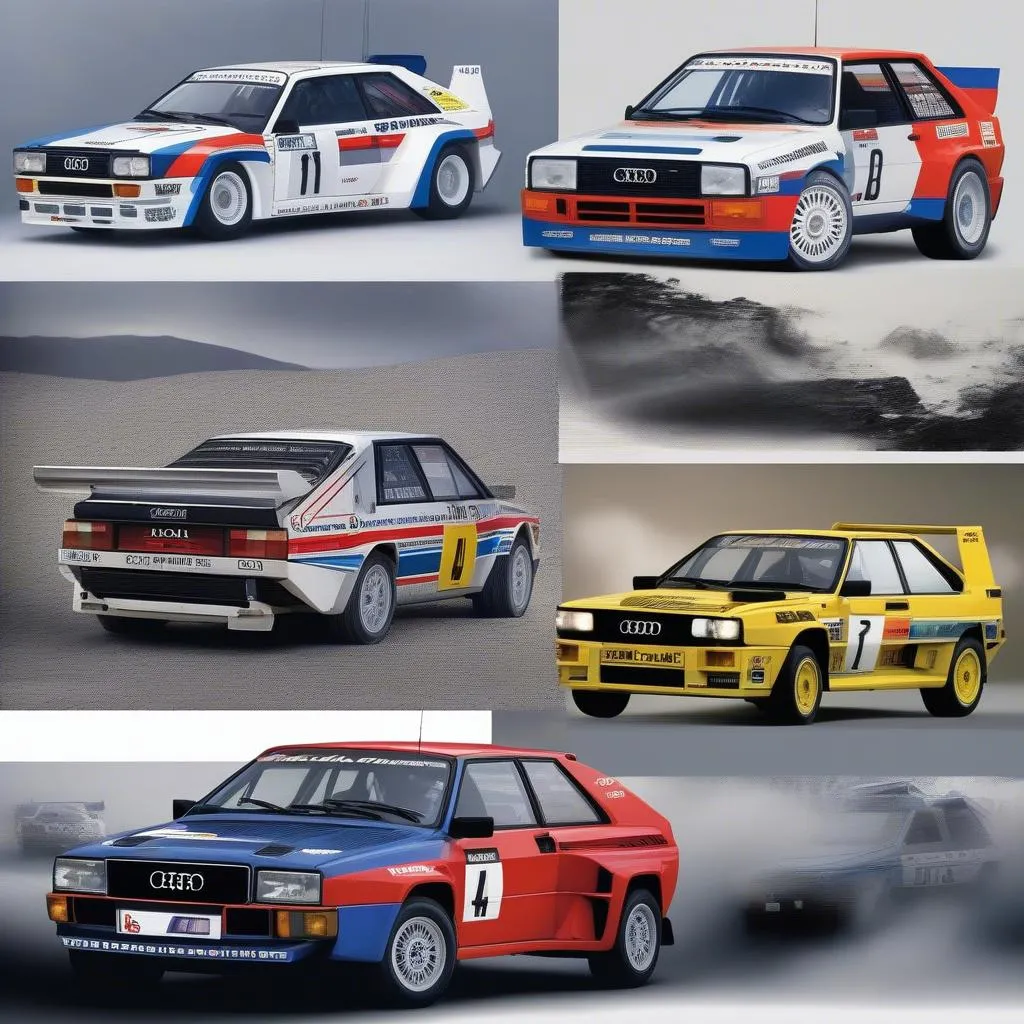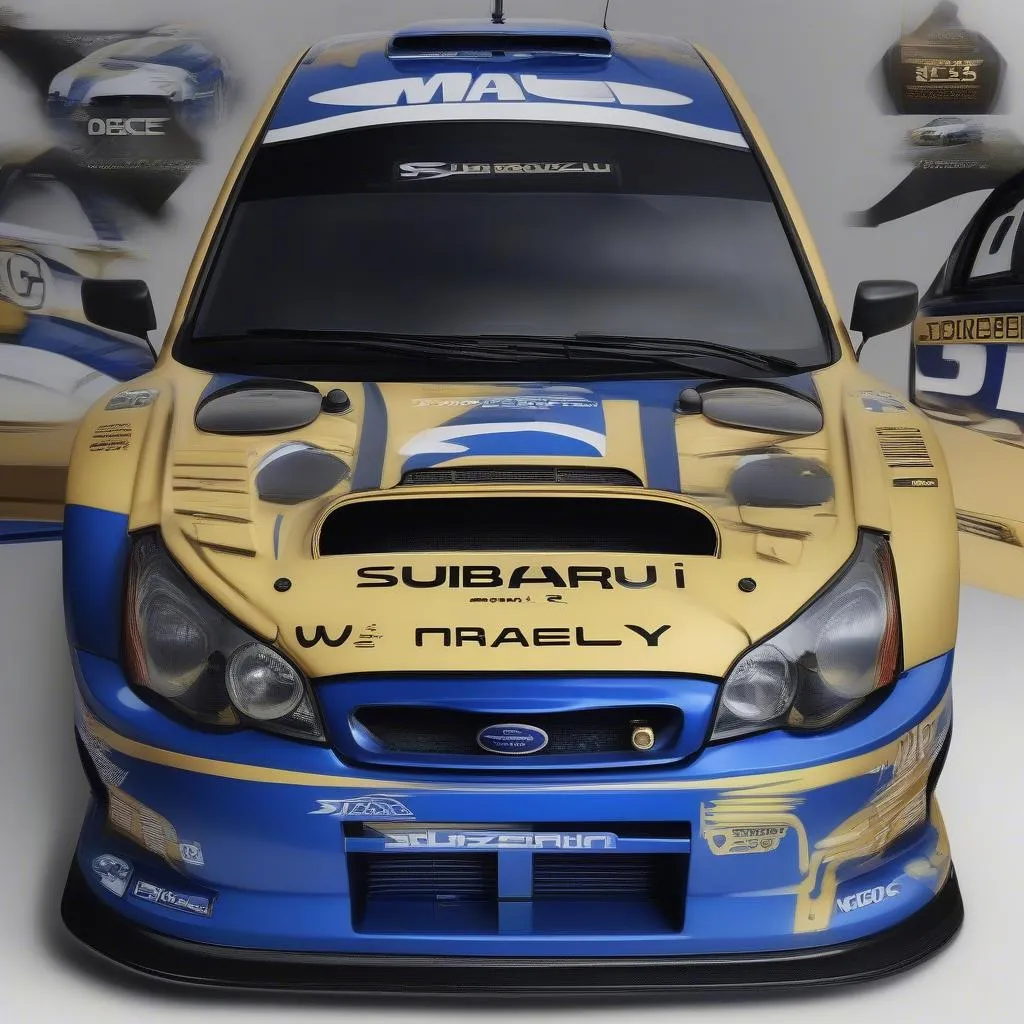Have you ever wondered what makes rally cars so special? These high-performance vehicles are engineered to conquer challenging terrains, from dirt roads to snow-covered mountains. But what exactly are the key characteristics that set rally cars apart from their everyday counterparts? Let’s delve into the world of Rally Car Models and discover the secrets behind their success.
Understanding Rally Car Models: A Glimpse Into the World of High-Performance Racing
Rally car models are purpose-built vehicles designed for competitive off-road racing. Unlike their street-legal counterparts, rally cars are stripped down for weight reduction and equipped with specialized components to enhance their performance. From powerful engines and sophisticated suspension systems to robust drivetrains and advanced safety features, every aspect of a rally car is meticulously engineered for maximum speed and control in demanding environments.
The Evolution of Rally Car Models: A Journey Through Time
The history of rally car models is closely intertwined with the development of automotive technology. Early rally cars were often modified versions of production vehicles, with advancements in engine technology, suspension systems, and safety features gradually shaping the modern rally car.
The Golden Age of Group B: Power, Performance, and Tragedy
The Group B era (1982-1986) is arguably the most legendary chapter in rally car history. This era saw the emergence of powerful, purpose-built cars with cutting-edge technology, pushing the boundaries of performance and design. From the iconic Audi Quattro to the legendary Lancia Delta S4, Group B cars were truly awe-inspiring machines.
 Group B rally cars: A look at the iconic Audi Quattro and Lancia Delta S4
Group B rally cars: A look at the iconic Audi Quattro and Lancia Delta S4
However, the Group B era was also marked by tragedy. The high speeds and challenging conditions led to several fatal accidents, ultimately leading to the ban of Group B in 1986.
The Rise of World Rally Championship (WRC): A New Era of Regulation and Innovation
After the demise of Group B, the World Rally Championship (WRC) shifted towards a new era of regulation, prioritizing safety and sustainability. The regulations implemented for the WRC cars in the 1990s focused on reducing engine power and emphasizing improved safety features. This new era saw the rise of manufacturers such as Subaru, Mitsubishi, and Toyota, introducing powerful and reliable rally cars that dominated the WRC scene.
The Modern Era of Rally Car Models: A Blend of Performance and Technology
Today’s WRC cars are highly sophisticated machines, blending high-performance engines with advanced electronic control systems. Modern rally cars are equipped with sophisticated electronic systems, including traction control, active differentials, and sophisticated suspension systems. These systems are designed to enhance both performance and safety.
The Key Features of a Rally Car Model: Built for Speed and Control
Let’s take a closer look at the key features that define a rally car model.
1. Powerful Engines: The Heart of a Rally Car
Rally cars are designed for raw speed, so they require powerful engines capable of delivering high torque output, essential for navigating challenging terrain.
2. Advanced Drivetrains: Conquering Any Terrain
Rally cars are renowned for their exceptional traction and handling, thanks to their advanced drivetrains. Most rally cars employ all-wheel-drive systems, ensuring maximum grip and power transfer to all four wheels, enabling them to navigate even the most treacherous surfaces.
3. Robust Suspension Systems: Adapting to the Road Ahead
Rally cars require sophisticated suspension systems that can adapt to the ever-changing terrain. Rally car suspensions are designed to handle rough surfaces, jumps, and high-speed cornering, ensuring stability and control.
4. Lightweight Construction: Performance Through Efficiency
Rally cars are built for speed and agility, and weight reduction is a crucial factor. To achieve this, rally car manufacturers employ lightweight materials and specialized construction techniques.
5. Advanced Safety Features: Protecting the Driver
While rally cars are designed for speed, safety is paramount. Rally car models are equipped with extensive safety features, including roll cages, fire suppression systems, and robust safety harnesses.
Popular Rally Car Models: A Look at Some of the Most Iconic Names
The world of rally racing has seen numerous iconic car models that have left their mark on the sport. Here are a few noteworthy examples:
1. Ford Focus RS WRC: A Legacy of Success
The Ford Focus RS WRC, a popular choice for rally enthusiasts, has a long history of success in the WRC. Known for its agile handling and powerful turbocharged engine, the Focus RS WRC has been a dominant force in rally racing.
2. Subaru Impreza WRC: The Rally Legend
The Subaru Impreza WRC has become a legend in the world of rallying. Its symmetrical all-wheel drive system and powerful turbocharged engine have consistently delivered high-performance results, solidifying its reputation as a true rally car.
 Subaru Impreza WRC: A rally legend
Subaru Impreza WRC: A rally legend
3. Toyota Yaris WRC: A Modern Contender
The Toyota Yaris WRC has made a significant impact on the WRC scene. The Yaris WRC is known for its sleek design, powerful engine, and advanced all-wheel-drive system, making it a formidable competitor in the modern rally arena.
4. Hyundai i20 WRC: The Korean Challenger
Hyundai’s i20 WRC is a relatively new entry in the world of rally racing. However, it has quickly made its mark, demonstrating impressive speed and performance. The i20 WRC features a powerful turbocharged engine and a sophisticated all-wheel-drive system, making it a force to be reckoned with.
Behind the Scenes: The Mechanics of Success
Rally car models are not just about performance. The success of a rally car is also attributed to the dedication and expertise of the teams behind them. From skilled engineers and mechanics to talented drivers, the world of rally racing relies on a collective effort to achieve victory.
The Future of Rally Car Models: A Focus on Sustainability and Technology
As automotive technology continues to evolve, the future of rally car models will likely see a greater emphasis on sustainability and technology. Expect to see more hybrid and electric rally car models as the automotive industry shifts towards a greener future.
Frequently Asked Questions (FAQs)
What are some of the most successful rally car models?
Some of the most successful rally car models include the Ford Focus RS WRC, the Subaru Impreza WRC, the Toyota Yaris WRC, and the Hyundai i20 WRC.
What makes a rally car different from a normal car?
Rally cars are specifically designed for off-road racing and feature a combination of high-performance components, including powerful engines, advanced drivetrains, robust suspension systems, and lightweight construction.
What are the safety features of a rally car?
Rally car models are equipped with comprehensive safety features, such as roll cages, fire suppression systems, and robust safety harnesses, to protect the drivers in demanding race conditions.
Where can I find more information about rally cars?
You can explore additional information on rally cars and their features at automotive websites, such as the official websites of major automotive manufacturers, rally racing organizations, and specialized automotive publications.
Explore the Thrill of Rally Racing
If you’re fascinated by the world of rally cars and the excitement of off-road racing, explore our website for more insights into rally car models and the world of rally racing. We’ve got articles on a wide range of automotive topics, from car technology to racing history.
Need Assistance with Diagnostics Tools?
Do you need help setting up and configuring diagnostics tools for your European car? Our team of experienced automotive professionals is here to help. Contact us via WhatsApp: +84767531508 for expert assistance and 24/7 support.